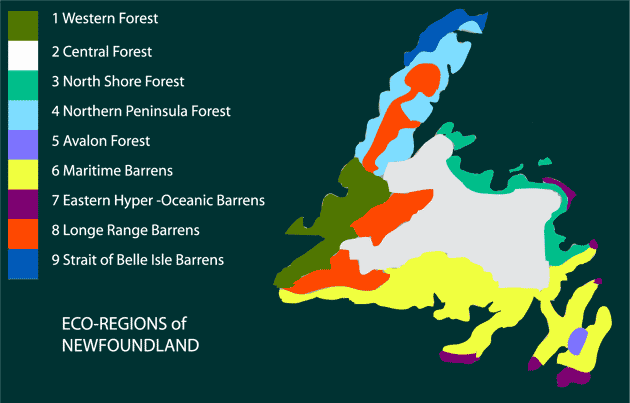
Click color squares for more info.
ECO-REGION 1Western Newfoundland Forest |
Characteristics
Mountainous terrain, most geologically diverse.
Heavily Forested, Most favourable climate for plant growth.
Longest growing season, Highest temperatures and humidity.
Greatest temperature variations due to changes in elevation.
Heaviest snowfalls, > annually.
Balsam Fir.
Noteworthy residents.
Eastern Chipmunk, Pine Marten, American Toad.
Back to Map
ECO-REGION 2Central Newfoundland Forest |
Characteristics
Gently rolling hills, greatest temperature range,
dry in summer, lightest winds.
Heavily forested with black spruce/kalmia (goowitty).
Predominant tree types
Black Spruce, white birch & trembling aspen.
Rare tree types
Red Pine.
Noteworthy residents.
Eastern Chipmunk, Pine Marten, Northern Hawk Owl, Northern Flicker
Green Winged Teal.
Back to Map
ECO-REGION 3North Shore Forest |
Characteristics
Irregular coastline, rolling hills, lowest rainfall,
warmest coastal area in summer.
Predominant tree types
Black Spruce, balsam fir & white birch, less abundant white spruce & aspen.
Rare tree types
Red Pine.
Noteworthy residents.
Common Redpoll, Bald Eagle, Osprey.
ECO-REGION 4Northern Peninsula Forest |
Characteristics
Divided east from west by the Longe Range Mountains.
Flat lowlands to the west, foothills to the east.
Coolest climate, lowest precipitation/ low evapotranspiration.
Predominant tree types
Balsam fir, black spruce at high elevations. Past the northern limit for white birch & pine, red maple & trembling aspen.
Noteworthy residents.
Northern Harrier, American Bittern & Short-eared Owl in wetlands.
ECO-REGION 5Avalon Forest |
Characteristics
Low elevation, irregular low hills with steep sides.
Scattered with small ponds and bogs.
Cool summers, mild winters, frequent fog,
high precipitation but little snowcover in winter.
Predominant tree types
Yellow Birch with spruce & fir.
Noteworthy residents.
Goshawk, American Bittern & Sharp Shinned Hawk.
ECO-REGION 6Maritime Barrens |
Characteristics
Low, undulating, open country. Barren due to frequent fires.
Cool summers, mild winters, frequent fog,
high precipitation with no permanent snowcover in coastal areas.
Predominant tree types
Some Balsam Fir & Yellow Birch in valleys.
Noteworthy residents.
Wintering grounds for large herds of caribou, 21 major seabird colonies offshore. Rough Legged Hawk, Short-eared Owl, Sharp Shinned hawk, Belted Kingfisher.
ECO-REGION 7Eastern Hyper-Oceanic Barrens |
Characteristics
Flat to rolling, open country.
Most oceanic climate, very cool summers, mild winters, frequent fog,
high precipitation with variable snowcover.
Predominant tree types
Treeless coastal barren, fir tuckamoor.
Noteworthy residents.
Includes the largest seabird colonies. Rough Legged Hawk, Snowy Owl, Short-eared Owl,
Northern Gannet, Harlequinn Duck, Northern Harrier, Atlantic Puffin.
ECO-REGION 8Long Range Barrens |
Characteristics
Mountainous, highlands, plateaus.
Short cool summers, long cold winters, persistant snow cover.
Predominant tree types
Treeless highland barren, spruce tuckamoor, Balsam Fir in deep sheltered valleys.
Noteworthy residents.
Summer range for Humber caribou herd, year round for Northern Peninsula herd.
Arctic Hare, Rough Legged Hawk, Snowy Owl, Short-eared Owl, Northern Harrier.
ECO-REGION 9Strait of Belle Isle Barrens |
Characteristics
Flat & rocky along the western coast, hills to the east.
Short cool summers, long cold winters, lowest island temperatures.
Pack ice present until early summer, potential for frost year round.
Low
precipitation, persistant fog.
Predominant tree types
Treeless barrens, tuckamoor & tundra.
Noteworthy residents.
Polar Bears drift ashore on the pack ice. Peregrine Falcon, Gyrfalcon,
Red-throated Loon, Belted Kingfisher.